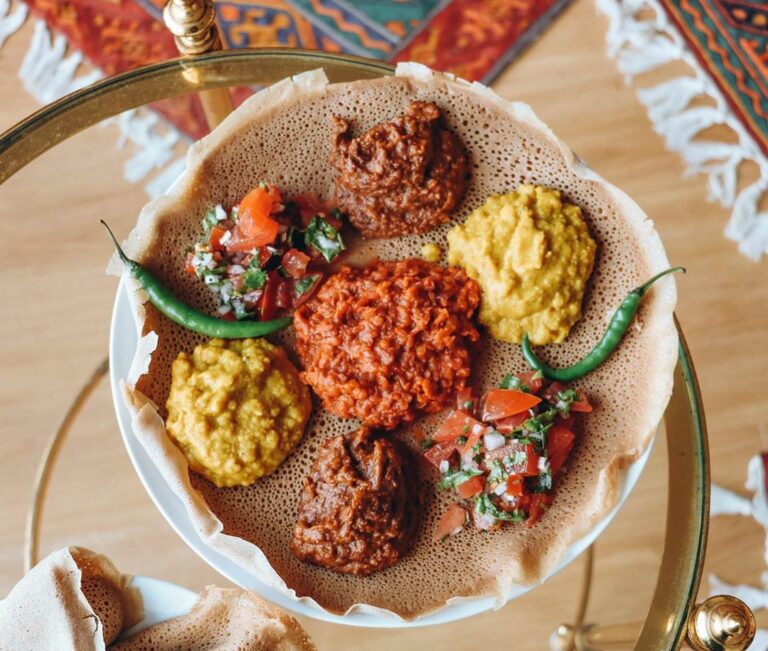Introduction: Understanding Doro Wat
Doro Wat is a traditional Ethiopian stew that is considered the national dish of Ethiopia. It is a spicy, rich, and savory dish that is made with chicken, onions, and a blend of spices. It is often eaten with injera, a sourdough flatbread that is used as a utensil to scoop up the stew. Doro Wat is a dish that is steeped in history and tradition, and it is an important part of Ethiopian culture.
Origins and History of Doro Wat
Doro Wat has a long and storied history in Ethiopia. It is believed to have originated in the northern part of the country, in the region of Tigray. Over time, the dish spread throughout Ethiopia, and it became a staple of Ethiopian cuisine. Doro Wat is often served on special occasions, such as weddings and religious celebrations, and it is a dish that is deeply ingrained in Ethiopian culture.
Ingredients and Cooking Techniques
Doro Wat is made with a variety of ingredients, including chicken, onions, garlic, ginger, berbere (a blend of spices), and sometimes, hard-boiled eggs. The chicken is marinated in lemon juice and spices before it is cooked with the onions and berbere. The dish is then simmered for several hours until the chicken is tender and the sauce is thick and rich. Doro Wat is traditionally cooked in a clay pot over an open flame, but it can also be made in a regular pot on the stove.
Regional Variations of Doro Wat
As with many traditional dishes, there are regional variations of Doro Wat. In some parts of Ethiopia, the dish is made with beef instead of chicken. In other regions, different spices are used to make the berbere blend. Some variations of Doro Wat also include vegetables, such as potatoes and carrots. Despite the variations, the basic ingredients and cooking techniques remain the same.
Significance of Doro Wat in Ethiopian Culture
Doro Wat is an important part of Ethiopian culture, and it is often served at special occasions and celebrations. It is a dish that is shared with family and friends, and it is a symbol of unity and togetherness. In Ethiopia, it is considered a sign of hospitality to serve Doro Wat to guests, and it is a dish that is often prepared with great care and attention to detail.
Doro Wat in Religious Celebrations
Doro Wat is often served during Ethiopian religious celebrations, such as Easter and Christmas. During these celebrations, the dish is prepared with even greater care and attention to detail, and it is often served with special sides and accompaniments. In some parts of Ethiopia, Doro Wat is also served during the fasting period of Lent, when meat is traditionally avoided.
Health Benefits of Doro Wat
Doro Wat is a nutritious and healthy dish that is rich in protein, vitamins, and minerals. Chicken is a good source of lean protein, and the blend of spices used in the dish has been shown to have anti-inflammatory and antioxidant properties. However, it is important to note that Doro Wat is a spicy and rich dish that should be consumed in moderation.
Enjoying Doro Wat: Serving and Pairing Suggestions
Doro Wat is traditionally served with injera, a sourdough flatbread that is used to scoop up the stew. It can also be served with rice or bread. To balance out the spiciness of the dish, it is often served with a side of yogurt or sour cream. Doro Wat pairs well with a variety of drinks, including Ethiopian beers and tej, a honey wine. It is a dish that is meant to be shared and enjoyed with friends and family.

